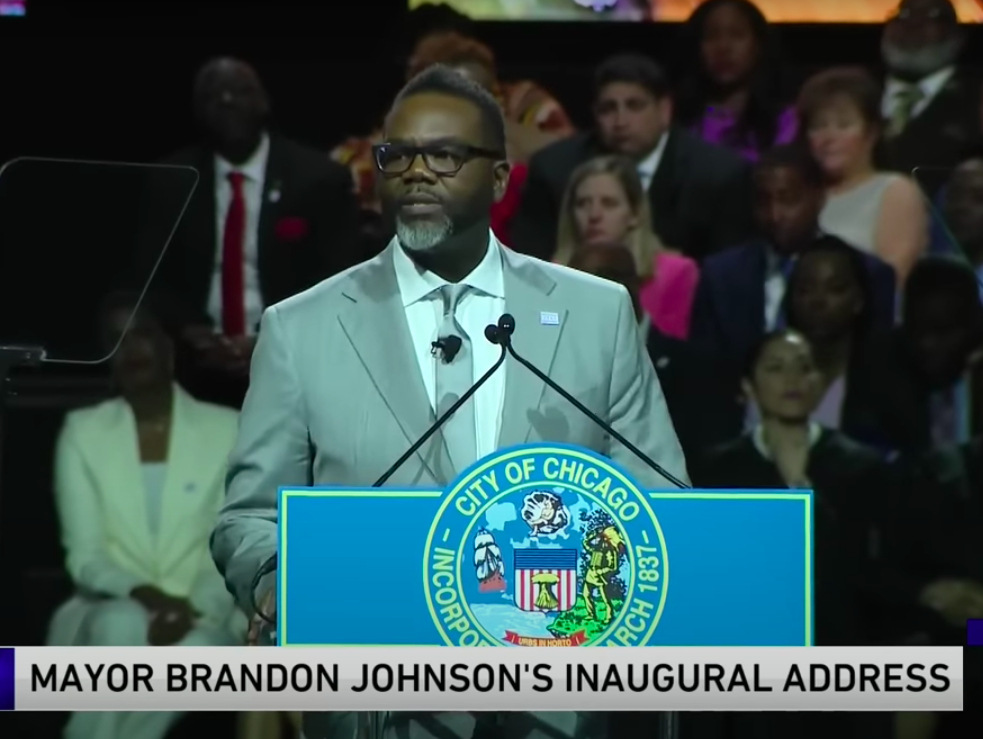Yesterday, amid much fanfare at the Credit Union 1 Arena, Brandon Johnson was sworn in as the 57th Mayor of Chicago. In a stirring inaugural address, Johnson called for unity to surmount a litany of ills plaguing the city, including a rise in violence, under-resourced public schools, and an “unsafe and unreliable” public transportation system. "So much so," Johnson said, "that parents refuse to let their children ride, even when the CTA could be the pathway to opportunity and enrichment."
Near the end of his speech, Johnson "called in" policy makers and advocates to work together for better public safety, education and transportation. He said, "I believe we can do something really bold and fix our public transportation system. We can secure safety and convenience for cyclists while making significant investments in the reliability, the safety and the connectivity of our buses and trains in every single neighborhood."
It won’t be easy. The Johnson administration is staring down a string of hurdles to restoring service on the beleaguered CTA: continued staffing shortages, wide gaps between next buses and trains, and ongoing public concerns about safety and cleanliness, all shadowed by a looming $730 million fiscal cliff in 2026 when federal Covid relief funding runs out. Despite increasingly congested roads and freeways, more people are driving than before the pandemic, and a worsening epidemic of traffic violence took the lives of almost 40 people on foot or bicycle in Chicago last year alone.
The mayor’s transportation platform outlines a broad plan to improve and restore CTA and make streets safer for all users, funded with new state and federal dollars. Much of the platform echoes the priorities of the Better Streets Chicago Action Fund, a sister organization of sustainable transit advocacy group Better Streets Chicago, which endorsed Johnson in his mayoral run:
- building bus rapid transit (BRT) infrastructure, including 500 bus priority signals
- working with unions to hire and retain bus and train operators
- eliminating fares for Chicago Public School students, seniors and people with disabilities
- making all train stations ADA accessible
- improving Blue Line service to and from Forest Park
- finishing the Red Line extension project
- deploying Transit Ambassadors to provide resources to riders in need of housing and other services
Johnson also promises to plow the sidewalks, create a grid of streets with lowered speed limits to improve cycling safety, expand concrete curb-protected bike lanes, and create a citywide planning process for bike and pedestrian infrastructure improvements that brings advocates across transportation, housing, environmental justice and accessibility to the table. These commitments bode well for the future of the Chicago Cycling Strategy, a framework for creating a connected, protected bicycle network published just weeks before the mayoral runoff—timing that had some advocates worried this would be yet another plan shelved with the change of administration.
Johnson recently announced over 400 appointees to the “Chicago for the People Transition Committee” and 11 subcommittees, a group of business leaders, activists, policy experts and community members tasked with creating a written report to guide the work of the new administration. A transportation subcommittee will be co-chaired by former mayoral candidate and state representative Kam Buckner, who had the most progressive and comprehensive transportation platform of the candidates.
Also co-chairing are Kirk Dillard, chairperson of the Regional Transportation Authority, and Roberto Requejo, executive director of Elevated Chicago, a coalition that is the primary proponent of equitable transit-oriented development policies and ordinance in Chicago.
The housing subcommittee will be co-chaired by Julie Dworkin, director of policy for the Chicago Coalition for the Homeless; Jonathan Jones, director of diversity for the Mid-America Carpenters Regional Council; and Sendy Soto, a senior director at the Chicago Community Trust and a former managing deputy commissioner at the Chicago Department of Housing in the Lightfoot administration.
At the City Council level, Johnson appointed alderman Greg Mitchell (7th Ward) to chair the city’s Transportation Committee. The appointment gives teeth to the administration’s stated commitment to improving transportation on the south and west sides; Mitchell’s far south side ward, which includes Jeffrey Manor and Trumbull Park, is one of the least served by CTA. Johnson also appointed alderman Daniel La Spata (1st Ward), a frequent bicyclist and outspoken advocate for bike and pedestrian safety, to chair the Pedestrian and Traffic Safety Committee.
Streetsblog will be following the discussion of recommendations from the transition and City Council committees. They have their work cut out for them, but as the new mayor rightly said in his inauguration address, "These investments won’t just benefit our economy, they’ll result in a safer and more livable city for all of us."




